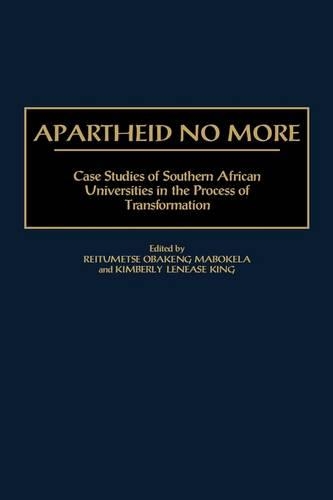
Apartheid No More: Case Studies of Southern African Universities in the Process of Transformation
(Hardback)
Publishing Details
Apartheid No More: Case Studies of Southern African Universities in the Process of Transformation
By (Author) Reitumetse Obakeng Mabokela
Edited by Kimberly Lenease King
Bloomsbury Publishing PLC
Praeger Publishers Inc
28th February 2001
United States
Classifications
Tertiary Education
Non Fiction
Social discrimination and social justice
Ethnic studies / Ethnicity
Racism and racial discrimination / Anti-racism
378.1982996068
Physical Properties
Hardback
200
Description
The South African higher education system has historically been characterized by racial and gender inequities inherited from the discriminatory policies of the apartheid era. From the ascent to power of the National Party in 1948, tertiary institutions were divided along ethno-linguistic lines in accordance with the segregationist policies of the apartheid system. The 1990s ushered in a new political era characterized by the un-banning of political parties, the release of political prisoners, and the shift of political power from the Nationalist party to the government of national unity led by the African National Congress. Since the change of government in 1994 there has been a concerted effort to transform the system of higher education from one in which race, gender, and class determine access and success, to a more equitable one. The demise of apartheid in South Africa requires that educational institutions transform in order to reflect the changing nature of the country. This volume includes case studies on South African tertiary institutions immersed in the process of transformation, examining the issue of language policy at Afrikaans-medium institutions, the challenges that the historically white, English-medium institutions face when including a previously excluded group, the experiences of Black South African students enrolled at such institutions, and the challenges faced by historically disadvantaged institutions.
Reviews
Given the extraordinarily complex and diverse military environment of Atlantic Africa, this format works quite well, allowing Thornton to achieve a remarkable detailed and comprehensive reconstruction.-The International Journal of African Historical Studies
Read together these excellent case studies offer varied research which traverses different aspects of South African tertiary institutions. What emerges is a broad image which assists in the generation of theory while suggesting achievable ways out of the quagmire. The collection's contribution is to the fields of African studies, history, sociology, race and ethnic studies, as well as to various fields in education studies. Mabokela and King's text will be equally valuable to policy makers, who will also find the concluding exploration of policy implications prudent.-African Studies Quarterly
"Given the extraordinarily complex and diverse military environment of Atlantic Africa, this format works quite well, allowing Thornton to achieve a remarkable detailed and comprehensive reconstruction."-The International Journal of African Historical Studies
"Read together these excellent case studies offer varied research which traverses different aspects of South African tertiary institutions. What emerges is a broad image which assists in the generation of theory while suggesting achievable ways out of the quagmire. The collection's contribution is to the fields of African studies, history, sociology, race and ethnic studies, as well as to various fields in education studies. Mabokela and King's text will be equally valuable to policy makers, who will also find the concluding exploration of policy implications prudent."-African Studies Quarterly
Author Bio
REITUMETSE OBAKENG MABOKELA is Assistant Professor, Department of Educational Administration, Michigan State University. KIMBERLY LENEASE KING is Assistant Professor, Department of Educational Foundations, Leadership and Technology, Auburn University.
